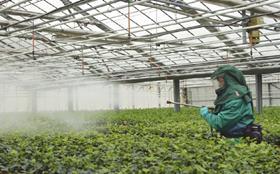
Freshfel, the European fresh produce association, has dismissed claims suggesting that nearly half of the fruit and vegetables in the European Union are contaminated with pesticide residues.
A statement released by Pesticide Action Network (PAN) Europe had said that fresh produce and cereals in the EU contained record levels of pesticides, as reported in the European Union food monitoring report, due for release at the end of October.
However, Freshfel stated that it deeply regretted the 'scaremongering' tactics of certain groups that it said were attempting to influence ongoing political discussions on future authorisation rules for pesticides.
The group said that for reasons of enforcement, agencies take more samples of food items that are expected to contain pesticides or that exceed maximum residue limits (MRLs), and therefore the report's figures were 'not representative of the actual market situation'.
'Consumer safety risk assessments have demonstrated that the presence of some residues in food does not put the consumers at risk,' said Freshfel's food safety officer Frédéric Rosseneu. 'It cannot be stressed strongly enough that products exceeding legal limits are unacceptable to all operators in the food chain even if this does not necessarily imply a particular health risk.'
And Mr Rosseneu added: 'While we understand that consumers would prefer not to have any residues in their food, this is not always possible in practice.'
In a statement PAN Europe had said that, according to the EU report, 49 per cent of the fresh produce tested in the 2006 study was found to contain pesticides, an increase of 20 per cent over the past five years. The report said that 4.7 per cent of fruits, vegetables and cereals contained pesticides at concentrations above MRLs.
PAN said that 23 pesticide substances detected in the investigation were at levels 'high enough to present an acute risk to public health'. The worst affected foods, the group said, were grapes (71 per cent contaminated), bananas (56 per cent contaminated) and peppers (46 per cent contaminated).
'These are the worst pesticide results we've ever seen,' said Elliott Cannell, coordinator of PAN Europe. 'A record proportion of fruit and vegetables are contaminated, while 23 pesticides were detected at levels high enough to present an acute risk to public health - according to the EU's own risk calculations.
'The need to reduce exposure to hazardousa pesticides is more urgent now than ever,' he added. 'Politicians in Brussels must back the removal of the worst pesticides from the food chain, and ensure that hazardous pesticides are replaced with safer alternatives wherever possible.'



